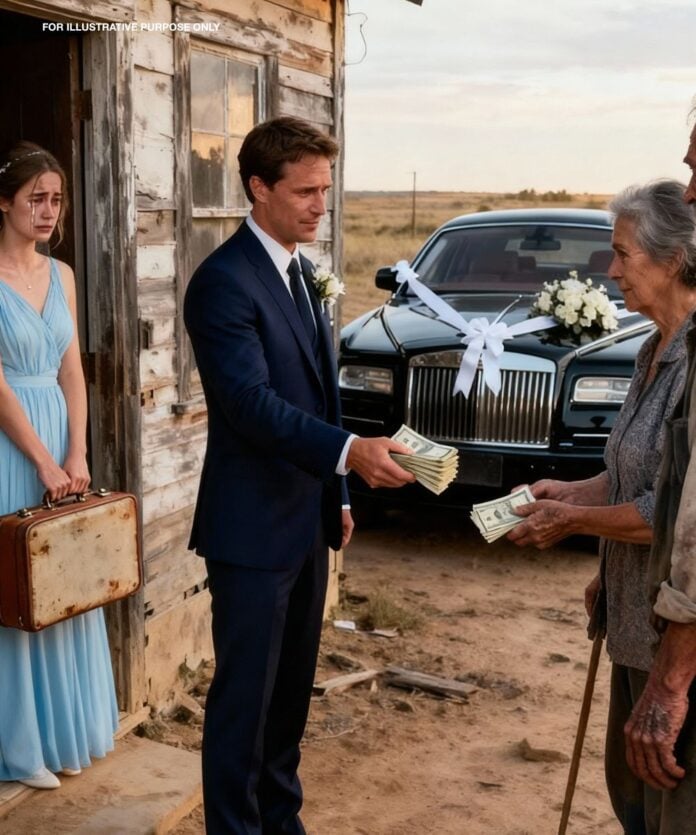In the summer of 1966, the air over Harmony Creek, Tennessee, hung heavy and dry. The once-green fields had turned to dust, the crops withered, and families who had worked the same land for generations began to break under the weight of debt and hunger. Among them was the Hayes family — proud, poor, and desperate.
Walter Hayes was a hardworking man who believed in order, obedience, and appearances. His daughter, twenty-year-old Matilda, had lived her entire life under his quiet rules: speak softly, work hard, and never dream beyond what could be stitched, cooked, or cleaned. While other young women wore bright dresses and went to church dances, Matilda stayed home, her world no bigger than her father’s voice.
Then came the drought — and with it, despair.
For weeks, the Hayes family survived on little more than watered-down grits. Matilda’s younger siblings cried themselves to sleep from hunger. Her mother’s eyes stayed red from tears she never let fall in front of her children. And one night, as the house sat in heavy silence, Matilda overheard a conversation that would change her life forever.
A Daughter Sold to Save a Family
In the small parlor, a man’s voice murmured under the hiss of a lantern. His name was Arthur Shaw — a wealthy, reserved farmer twice Matilda’s age. Everyone in Harmony Creek knew him as the man with money but no family, the one who lived in a big house at the edge of town and kept to himself.
When the visitor left, Walter called his daughter in. He couldn’t quite meet her eyes.
“Matilda,” he said quietly, “Mr. Shaw has asked for your hand.”
She stood frozen. “But I don’t know him.”
“He’s a good man,” her father insisted. “He’ll take care of you. And he’s offering enough to help us all.”
“How much?” she asked.
He hesitated before answering. “Two thousand dollars.”
Her voice trembled. “So… you’re selling me?”
Her father’s silence was the only answer she needed.
Nine days later, Matilda walked down the aisle in a lace dress Arthur had paid for, her steps slow and heavy, her eyes lowered to the floor. Her first kiss — brief and stiff — came at the altar. Her wedding night felt less like a beginning and more like a sentence she couldn’t escape.
A Truth That Changed Everything
When Arthur closed the door to their room that night, Matilda braced herself for what she had been taught to fear. But instead of claiming what had been purchased, Arthur sat down across from her, his face pale, his hands shaking.
“Matilda,” he began, his voice soft, “I know this wasn’t your choice. But I didn’t bring you here to hurt you.”
He explained, haltingly, that he was unable to live as a husband in the traditional sense. He could never father children. He had lived alone for years because of it, watching friends marry and build families while he stayed apart, lonely but resigned.
“I only wanted a companion,” he said. “Someone to talk with, to walk beside. You are free to have your own room. I won’t ask for anything you don’t want to give.”
For the first time, Matilda looked into his eyes and saw not cruelty, but pain — the same kind of quiet pain she had lived with all her life. That night, they slept in separate rooms, but something unexpected began to take root: understanding.
The Gift of Freedom
In the weeks that followed, Matilda learned that Arthur’s home held more than silence. Behind the doors of his study was a small library — shelves of books she had never been allowed to touch before. When he caught her reading one morning, he simply said, “Everything here is yours too. Nothing is forbidden.”
It was the first time anyone had ever given her permission to exist on her own terms.
Days turned into weeks, and the frightened girl who had arrived with downcast eyes began to grow into someone curious and capable. She learned to balance the farm’s ledgers, care for the animals, and help manage the land that kept them both alive.
One evening, as the sun melted into the Tennessee hills, Arthur asked gently, “Matilda… are you unhappy here?”
She thought for a long time before answering. “No,” she said at last. “For the first time, I can breathe.”
When Care Becomes Love
That winter, Arthur fell gravely ill. Fever took his strength, and the quiet house filled with worry. Matilda sat by his bedside through the long nights, reading aloud by lamplight, cooling his forehead, whispering prayers she barely remembered from childhood.
When he finally opened his eyes after days of fever and saw her sleeping beside the bed, he whispered, “You stayed.”
Matilda smiled. “I am your wife,” she said simply.
Something shifted between them after that. Not passion, but devotion — steady and real.
They built a life together marked not by wealth or romance, but by respect and gentleness. The neighbors whispered about the odd pair — the young wife and the older man who never seemed to touch her — but neither of them paid attention. Their peace was enough.
The Family They Chose
Years passed quietly. Their farm prospered, and their home grew warmer, yet one thing was missing: the sound of children.
One day, Matilda looked at Arthur and asked softly, “What if we adopted?”
Hope flickered in his eyes. “If that’s what you want.”
“It is,” she said. “Family can be chosen.”
Soon after, they brought home a shy little girl named Ella, who clung to Matilda’s dress like a shadow. Later came Liam, and then Mia — three children who filled the house with laughter and the smell of fresh bread and muddy boots by the door.
Matilda’s life, once silent and confined, now echoed with the voices of children who called her “Mama.” The home she had entered as a frightened bride had become the one place in the world where she was free.
A Legacy of Kindness
Over time, people in Harmony Creek began to see the Shaws differently. They were still quiet, still private, but their kindness spread. They shared food with struggling families during harsh winters and helped rebuild barns after storms.
Matilda often told her children, “Love comes in many forms. Ours may not look like anyone else’s, but it’s ours — and that makes it beautiful.”
When Arthur passed years later, the town gathered not out of curiosity but respect. They spoke not of his wealth but of the peace he gave to a young woman who had once been sold and who found her freedom within his home.
What Matilda Taught the World
Matilda lived on in the farmhouse surrounded by her grown children and grandchildren. She kept a small photo of Arthur by her window, the man who had given her not luxury, but liberty.
When asked about her past, she would smile faintly and say, “I was once sold for money, but I was bought with kindness. And that made all the difference.”
Her story reminds us that dignity can grow even from hardship, and that love — real love — is not always what the world expects it to be. Sometimes it’s found in patience, in shared silence, in the freedom to become who you are meant to be.



